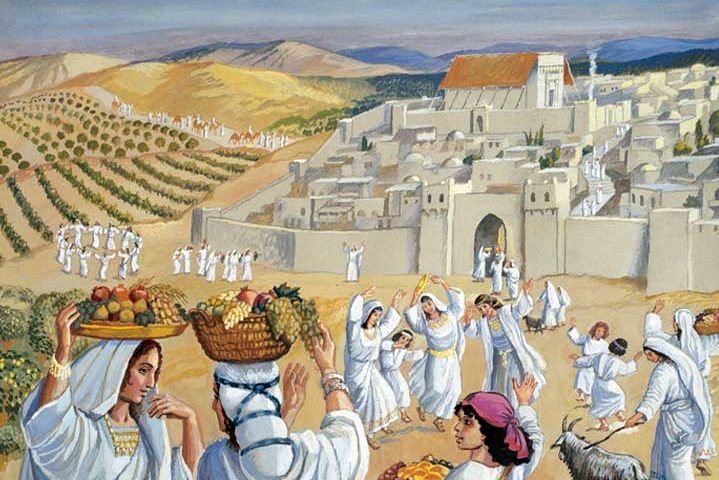THE DAY OF LOVE
 Yesterday, we commemorated and celebrated Tu B’Av – the 15th day of the month of Av. This day has become known, especially in modern Israel, as the holiday of love. This is a nice name – but only if we understand the real meaning of the word – if we understand what is true love, complete love.
Yesterday, we commemorated and celebrated Tu B’Av – the 15th day of the month of Av. This day has become known, especially in modern Israel, as the holiday of love. This is a nice name – but only if we understand the real meaning of the word – if we understand what is true love, complete love.
“There were never days as good for Israel as Tu B’Av and Yom HaKippurim [Yom Kippur],” our sages teach. What’s the connection between these two days?
Tu B’Av is the day of love between man and wife, the love that brings to perfection. “Male and female He created them, and He blessed them, and He called their name Adam (Man) (Gen. 5,2).” It is not “people” who were created here, but “Adam” – the singular, perfect form of mankind. We learn here the ideal form: when man and woman are together, in total harmony, with true complementary and mutual love and cooperation.
THE ULTIMATE LOVE
But how can we learn what this relationship is? The best example is the Song of Songs, the story of the complete love between the Jewish People, and every single Jew thereof – and our Father in Heaven. Yom Kippur is the day of unbounded love towards Hashem, through self-sacrifice and affliction of the soul, ceding all our physical needs, in accordance with the commandment of the day. This love that is based on giving ourselves totally to G-d is the essence of Yom HaKippurim. Both Tu B’Av and Yom Kippur, then, are days of true love.
THEY DARED NOT BE SILENT
Our Sages discuss at length the events that occurred on the 15th of Av, that caused this day to be registered as a day of joy in our calendar. One of the reasons brought by the Talmud is that it was the day that the Tribes of Israel were again permitted to intermarry with each other. Rav Yosef tells us in the name of Rav Nachman that this occurred after the infamous incident of the Concubine in Binyamin (Judges 19-21) – the terrible blot on our national history, that which led to civil war and the near-total destruction of an entire tribe. It occurred when the Jewish People in toto – every tribe, every village (except for the town of Yavesh Gil’ad) – refused to accept a shocking act of senseless violence on the part of members of the tribe of Binyamin, and made war on this tribe for its refusal to censor and punish the perpetrators of the vile crime.
This calamity occurred during a very difficult period for Israel; the story begins with the words, “At this time there was no King in Israel,” and ends with the words, “Each man did that which was right in his own eyes.” And despite the lack of formal leadership, the nation was not silent in the face of such crimes. The people did not accept any explanations for what happened. There is no justification for violence, period.
NO RIGHT TO EXIST
This week, the pictures of the two children and their mother murdered by their father and husband screamed out at us from the front pages of the newspapers. How many murders of this sort must we suffer? How much violence? These are things that simply cannot be forgiven. From the story of the Concubine in Binyamin we must learn that we simply may not pass over this type of occurrence. We should close down the country! A society where things of this nature happen has no right to exist! This issue must not be taken off the agenda, and the reasons for it must be searched out and found – in the society, the education, and the life styles.
We must correct what needs correcting, and build up again. Only after the lesson was learned were the remaining young men of Binyamin allowed to remarry – and even that was not with the complete agreement of all. It was on Tu B’Av, the day of love, that the men of Binyamin were allowed to show that they had learned the true nature of relations between people. It was on Tu B’Av that true love was restored among the tribes of Israel.
Shabbat Shalom.
Rabbi Yossi Sarid – not Education Minister Yossi Sarid – is the head of the Mevaseret Zion Religious Council, and is one of the founders and teachers at the Mevaseret Zion Educational Center.
